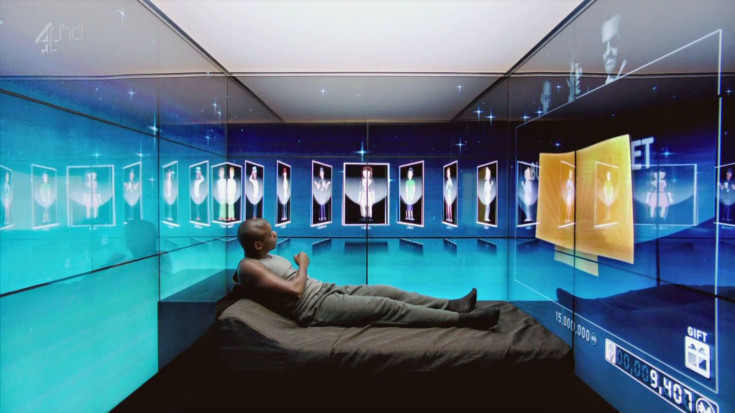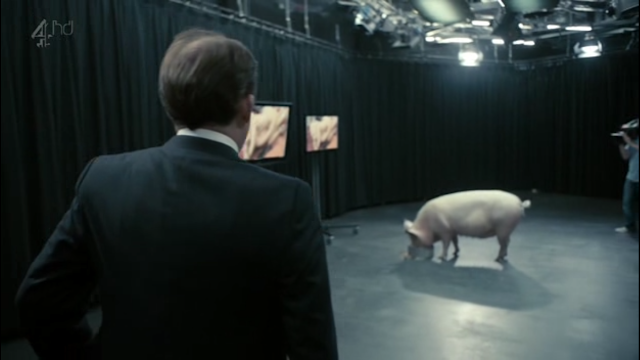 |
| The episode "White Christmas", starring Jon Hamm. The last episode to be aired on the UK's Channel 4 before the series moved to Netflix in 2016. |
Warning: The following post contains spoilers for episode 1 of Black Mirror.
It’s been a
while since I came across some good television, so I figured I’d try and check
off a box on my ever-expanding list of series to catch up on. It’s worth noting
that in the past, I used to get exceedingly attached to the shows I’d watch, at
the expense of many of my other priorities. But over the last two years I’ve
been able to find a better balance between work and play, and my TV diet has
shifted from mere entertainment to more informative programming.
As such, the increasingly popular Netflix sci-fi anthology Black
Mirror is different compared to your run-of-the-mill TV drama. For
starters, it’s an episodic anthology – every episode features a different cast,
crew, story and setting. Therefore, the only thing binding this show’s universe
together is the thematic threading woven by its writers, not by any particular
characters or stories. Second, the point of each Black Mirror episode is to serve as an allegory for the effects of
technology on our everyday lives. The bizarre and surreal scenarios presented
in the show are all just series creator Charlie Brooker's observations of how
our phones, computers and televisions – the titular “black mirrors” – reflect our
changing psyches and interactions with one another. In that sense, the show is
simultaneously drawing audiences into its dystopian fictional universe(s) as
well as making us more aware of the role technology plays on our real lives.
And it does so through some of the most finely-crafted television I’ve come
across in years.
Right from
the outset, one of the more impressive traits of Black Mirror is how fluidly it strides between genres, themes and
narrative structures. From the pilot onwards, we go from a satirical political
thriller to a dystopian, existentialist sci-fi tragedy, to not one but two
relationship dramas with a futuristic bent. As the series continues, we’re
treated to at least two horror-thrillers, a Star Trek-inspired space adventure, a touching
retro-futuristic love story, and a 90-minute Christmas special that begins like
a sitcom and ends with viewers’ heads both figuratively and literally spinning.
But despite this colorful stylistic platter, the show is notorious for using
any one of these genres as a means of telling bleak, terrifying stories that
carry trenchant social commentary along with them.
 |
| Season 1, Episode 2 - "Fifteen Million Merits", starring Get Out's Daniel Kaluuya. |
You are now entering spoiler territory…
Take the
infamous pilot episode, “The National Anthem”.
I’ve heard countless reports of fans of the show hearing from their friends
that they were disgusted to have been recommended Black Mirror after having watched this first episode. Why? Well,
the plot goes something like this: the fictional prime minister of the UK is
threatened with the murder of a beloved princess unless he films himself having
sex with a pig for the entire country to watch. And despite his best efforts to
thwart or deceive the kidnappers, he ends up actually having to go through with
the obscene act.
As a disclaimer, the other episodes of the series are very different from this one, but what’s
immediately appealing about this daring pilot is how brilliantly it’s written and
directed, taking this absurd scenario and playing it entirely straight. We get
to see dramatic shots of the PM looking out his window in somber contemplation.
Tense scenes of him arguing violently with his wife and staff. Frenetic
chitchat among media figures deciding which censorship rules to break in
landing the scoop on this bizarre national emergency. But what starts as an
amusing, seemingly satirical piece of political drama morphs into a truly
depressing ordeal that we witness the characters endure. We’re left thinking
“he can’t possibly do it, can he?” right up to the point where he actually
does, and maybe a minute or so into it as well. Of course, all we do see on
camera is a montage of onlookers displaying a smattering of emotions: shock,
amusement, horror, confusion, disgust, and almost certainly one or two looks of
arousal. But we, the viewer, are part of that crowd as well, perhaps wondering
whether it really was a good idea to listen to our friends’ TV recommendations.
 |
| "That scene." ("The National Anthem") |
I obviously
don’t fault viewers for recoiling at the fact that they just witnessed a
character fuck a pig in the very first episode of this series. Most of us
aren’t exactly into that, it would seem. But I believe that this episode is an
appropriate barrier-of-entry to the rest of Black
Mirror, despite being starkly different in its presentation compared to
most other episodes of the show. Charlie Brooker is testing his audiences’
capacity to look past the raw content presented on screen – starting with a
challenging, lurid example – and to actually try and decipher the thematic messaging
driving it all. As it turns out, the true horror of “The National Anthem” is
not that the prime minister of the UK fucked a pig on live television, but that
the insurmountable pressure from the media and from within his government led
him to such a decision in the first place. Throughout the episode there is talk
of the PM’s plunging approval ratings, his public persona, the accountability
of the government, and the celebrity status of the kidnapped princess (perhaps
a commentary on Kate Middleton and the superficiality of the Royal Family and
its extensive press coverage). Such factors – image, status, social
approval – can lead to us entirely corrupting our personal morals and dignity
so we can still cohere with the fabric of society. “The National Anthem” shows
us how the expanded role of social media only exacerbates this pressure and
leads us to increasingly define our roles in society based on popularity,
ratings, “buzz”. This could not be more relevant within our current political
climate and the nascent “digital age”.
No more spoilers past this point.
No more spoilers past this point.
Subsequent
episodes of Black Mirror have been
more ambitious with their production values and thematic depth - also, mercifully devoid of bestiality, though just as merciless with their storytelling. Episode
2 pits its protagonists in a dystopian, prison-like complex that forces its
citizens to consume inordinate amounts of advertising while accumulating virtual currency as a means of maintaining
their sustenance and socioeconomic status. The episode is in many ways bleaker
and more depressing than the pilot episode, not only with respect to the
inescapable situation plaguing its characters but to how closely it mirrors modern
consumerism and our collective slavery to corporate advertising. The episode to
follow returns to the modern world, but where the wealthy can choose to get a digital chip
implanted in their heads that stores video recordings of all of their memories
(think a “Snapchat story” of your entire life). It focuses on a married couple
carrying these chips, where the husband suspects his wife of having an affair. The
episode stirringly explores how even in a universe where privacy is almost
entirely obliterated by technology, people will still find ways to lie and deceive
one another. It’s the endurance of human fallibility in a society where stunning
technological breakthroughs redefine the way we interact with ourselves and
others. Not that different from the world we live in now, huh?
| Season 1, Episode 3 - "The Entire History of You". Memories can be digitally recorded, stored and replayed via the fictional "grain" technology, seen above. |
In fact, Black Mirror’s social commentary is so
apt that it predicted several world events prior to their occurrence. For
example, the season 3 premiere “Nosedive” features a society in which people’s
socioeconomic status is based on a 5-star “rating system” on a universally-used
social media app. While the episode’s intent was merely to satirize apps like
Instagram and people’s psychological dependency on Internet attention,
something frighteningly similar to the technology it depicted is now underway
in China. The Chinese government has planned the rollout of a “Social Credit
System” by 2020 that blacklists citizens who are perceived to have committed
wrongdoings and rewards citizens with more “approvable” lifestyles, using a government-arbitrated
“social credit” as its metric. Pilot programs are already in effect: in 2017,
the government stated that an estimated 6.15 million Chinese citizens were
banned from taking flights due to “social misdeeds.” And this March, the government
announced plans to add trains to the transport options withheld from those
with poor “social credit”. Multiple news sites jumped to comparisons with “Nosedive”
in covering developments on this issue.
 |
| Season 3, Episode 1 - "Nosedive", eerily similar to China's "Social Credit System". |
Other
examples of Black Mirror’s prophetic
storytelling include season 2, episode 3, “The Waldo Moment,” which features an
obnoxious animatronic television character being put on the ballot as a candidate
for Parliament. While the episode was poorly received when it aired in 2011, it
has since attracted renewed attention for its relevance to the US presidential election,
in which our own obnoxious television character found his way to the Oval
Office. And perhaps most absurdly, rumors broke in 2015 that former British
Prime Minister David Cameron engaged in sexual acts with a dead pig while a
student at Oxford, four years after “The National Anthem” aired on television. Brooker
was appropriately stunned, insisting that he knew nothing of this scandal when
writing the episode and that it was merely a once-in-a-lifetime coincidence.
As I
continue my way through Black Mirror,
I always find myself in itching to know “what happens next” despite the
independence of the episodes’ narratives and characters. That’s because the
real story behind this show is in its parallels to the relationship between technology, society and human nature itself. Never have I seen a TV show make such effective use of its
themes, where half the fun is in learning the philosophy encased in the
episode’s events rather than just treating that as an afterthought to the
“entertainment”. The series rests on the principle of having something to say,
rather than just to keep its audiences glued to the screen. But for the record,
it is pretty damn entertaining, too.
I "rate" Black Mirror a 5/5! Newcomers out there might want to skip episode 1 and come back to it later. It's a great episode, just not for everybody.
Thanks for reading!
I "rate" Black Mirror a 5/5! Newcomers out there might want to skip episode 1 and come back to it later. It's a great episode, just not for everybody.
Thanks for reading!
